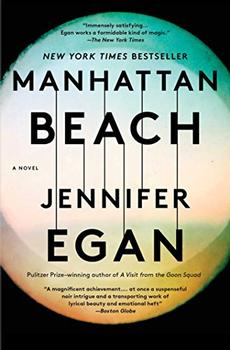Summary | Excerpt | Reading Guide | Reviews | Beyond the Book | Readalikes | Genres & Themes | Author Bio

As she hurried alongside Building 4, the structural shop, with its thousand dingy windows, she saw a girl climbing onto a bicycle. Anna didn't register at first that it was a girl; she wore the same plain blue work clothes they all did. But something in her bearing, the flair with which she mounted, caught Anna's eye, and she watched the girl glide away with a shiver of envy.
At a canteen near the piers, she bought her forty-cent boxed meal — today it was chicken, mashed potatoes, canned peas, and applesauce — and made her way toward Piers C and D, both close enough to her shop that she could eat (often while standing, even walking) and be back on her stool by twelve-fifteen. A ship had berthed at Pier C since the previous day, its sudden towering apparition almost otherworldly. With each step Anna took toward the ship, its height seemed to rise, until she had to tip her head fully back to follow the curved prow all the way up to the distant deck. It was thronged with sailors, identical-looking in their toylike uniforms and caps, all leaning over the rail to gawk at something below. In that same moment, a chorus of catcalls reached her. She went still, clutching her boxed lunch—then saw with relief that the object of their ardor was not her but the girl on the bicycle, who was riding back alongside the ship from the foot of the pier, a tousle of peroxide curls pried from her scarf by the wind. Anna watched her approach, trying to discern whether the girl was enjoying this attention or not. Before she could make up her mind, the bicycle hit a patch of gravel and skidded on its side, dumping its rider onto the brick-paved pier, to the jeering hilarity of the sailors. Had the men been within reach of the girl, they doubtless would have elbowed each other aside to rush to her aid. But at such a height, with only each other to show off for, they settled for an orgy of heckling:
"Aw, poor baby lost her balance."
"Shame she's not wearing a skirt."
"Say, you're pretty even when you're crying."
But the girl wasn't crying. She stood up angrily, humiliated but defiant, and Anna decided then that she liked her. She'd thought fleetingly of running to help the girl, but was glad she'd resisted—two girls struggling with a bicycle would be funnier than just one. And this girl would not have wanted help. She straightened her shoulders and walked the bicycle slowly to the top of the pier, where Anna was, giving no sign that she heard anything. Anna saw how pretty she was, with dimpled cheeks and flickering blue eyes, those Jean Harlow curls. Familiar, too—perhaps because she looked the way Lydia might have looked had she not been the way she was. The world was full of strangers (Betty Grable among them) for whom Anna felt a sisterly affection for that reason. But as the girl stalked past, ignoring Anna, she recognized her as one of the girls whom reporters had chosen to follow in September, on the first day girls had started working at the Naval Yard. Anna had seen her picture in the Brooklyn Eagle.
When she was safely past the ship, the girl mounted her bicycle and rode away. Anna checked her wristwatch and discovered with horror that she was almost thirteen minutes late. She sprinted toward her building, aware of creating a mild spectacle by running. She flew past the inspectors on the first floor—all men, using ladders to measure bigger parts—and resumed her stool at 12:37, sweat coursing from her armpits along the inside of her jumpsuit. She fixed her eyes on the tray of small parts she was given each day to measure and tried to quell her panting. Rose, a married she was friendly with, gave her a warning look from the next table.
The micrometer was stupidly easy to use: clasp, screw, read. Anna had been delighted with this assignment at first; girls in trades like welding and riveting had needed six weeks of instruction, whereas inspecting required just a week of aptitude tests. She was among college girls, and Mr. Voss had used the word "elite" in his introductory remarks, which had pleased
were. More than one girl had wept, describing her terror that a husband or fiancé would not return. Anna couldn't listen. The talk stirred in her an uncomfortable anger at these girls, who seemed so weak. Thankfully, Mr. Voss had put an end to that topic during working hours, prompting an unlikely trill of gratitude in Anna. Now they sang songs from their colleges while they worked: Hunter, St. Joseph's, Brooklyn College, whose song Anna finally learned—not having bothered to in the year she was a student there.
Excerpted from Manhattan Beach by Jennifer Egan. Copyright © 2017 by Jennifer Egan. Excerpted by permission of Scribner. All rights reserved. No part of this excerpt may be reproduced or reprinted without permission in writing from the publisher.
Happiness makes up in height for what it lacks in length.
Click Here to find out who said this, as well as discovering other famous literary quotes!
Your guide toexceptional books
BookBrowse seeks out and recommends the best in contemporary fiction and nonfiction—books that not only engage and entertain but also deepen our understanding of ourselves and the world around us.